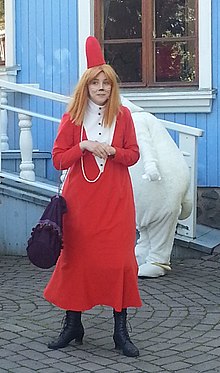
Fillyjonks (Swedish: Filifjonkan) are fictional characters from Tove Jansson's Moomins book series. They are one of the species living in the Moomin Valley.
Etymology
The word has no semantic meaning, but with the first element compare filibuffare "joker", filidera, "make bad noise", and with the second, fjompa/fjanta/fjolla + -an = "silly/foolish/fussy woman").
Plot
The first Fillyjonks we hear of are the late theatre director in Moominsummer Madness (the Rat is his widow) and the young Fillyjonk who joins the Snork Maiden in the late night jaunt to the wishing well. Later we meet the psychological study of the "Fillyjonk Who Believed In Disasters" in Tales from Moominvalley. Not a single moment of fantasy or joy, only duties and discipline; she is an extremely methodical person tied down with principles and has a deep rooted belief in prestige and tradition. Nevertheless, after a catastrophe, The Fillyjonk can be freed from the trammels of social expectation and can discover the joys of freedom, irrationality and self-expression. Deep inside she has had a wish to live freely as the Moomin family does, without any worries. Fillyjonks resemble humanoid rodents; they are tall and thin, with long muzzles and raccoon-like rings around their eyes.
Analysis
Analyzing the stereotypes in the Moomins series, Hanna Dymel-Trzebiatowska wrote that the Fillyjonks are an example of a stereotypical woman who is obsessed with "cleaning and raising well-behaved children. She is also neurotic and feels oppressed by her own mental constraints".
Dan Zahavi described Fillyjonks as a "striking" type of character whose "joyless life" revolves around "maintaining empty rituals and formal customs."
References
- Dymel-Trzebiatowska, Hanna (2022-08-11). "Moomins Take the Floor. Finnish Trolls in Contemporary Mass Social (Media) Events". Children's Literature in Education: 1–16. doi:10.1007/s10583-022-09497-6. ISSN 1573-1693. PMC 9365677. PMID 35971480.
- Zahavi, Dan (2018-07-01). "Manhattan Dynamite and no pancakes: Tradition and normality in the work of Tove Jansson". SATS. 19 (1): 5–19. doi:10.1515/sats-2017-3001. ISSN 1869-7577. S2CID 172068039.